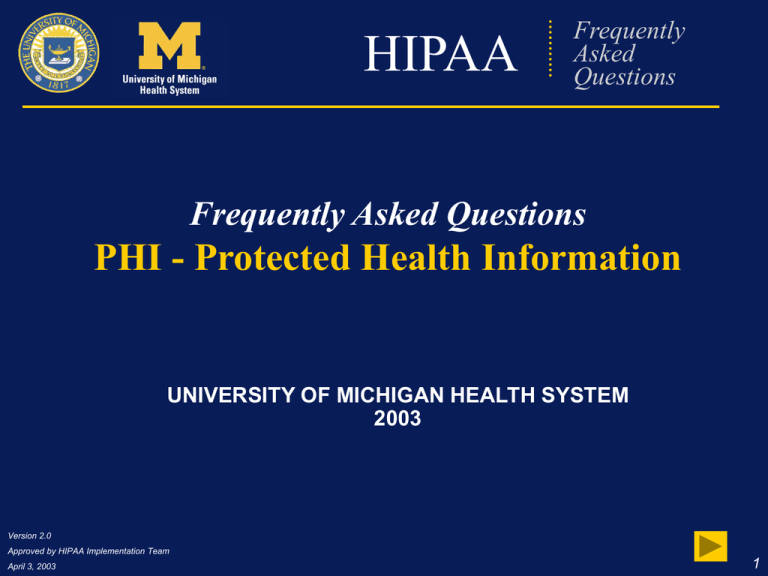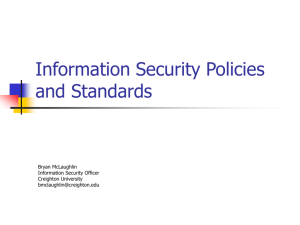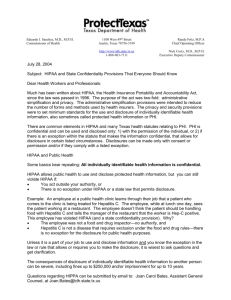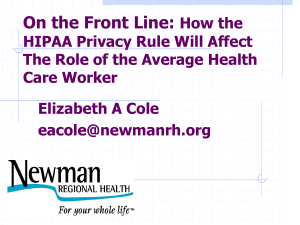HIPAA Frequently Asked Questions - University of Michigan Health
advertisement

HIPAA Frequently Asked Questions HIPAA Frequently Asked Questions Frequently Asked Questions PHI - Protected Health Information UNIVERSITY OF MICHIGAN HEALTH SYSTEM 2003 Version 2.0 Approved by HIPAA Implementation Team April 3, 2003 1 HIPAA Q: Is PHI the same as the medical record? A: Frequently Asked Questions No. HIPAA protects more than the official medical record. A great deal of other information is also considered PHI, such as billing and demographic data. Even the information that a person is a patient here is Protected Health Information. Version 2.0 Approved by HIPAA Implementation Team April 3, 2003 2 HIPAA Q: What if I’m accidentally overheard discussing a patient’s PHI record? Frequently Asked Questions A: It is not a violation as long as you were taking reasonable precautions and were discussing the protected health information for a legitimate purpose. The HIPAA privacy rule is not meant to prevent care providers from communicating with each other and their patients during the course of treatment. These "incidental disclosures" are allowed under HIPAA. Version 2.0 Approved by HIPAA Implementation Team April 3, 2003 3 HIPAA Q: If I overhear patient care information in the elevator or in the hallway, how should I handle it? Frequently Asked Questions A: If it seems appropriate, remind the speakers of the policy in private. If the conversation clearly violates policies or regulations, report it to the Privacy Officer. Version 2.0 Approved by HIPAA Implementation Team April 3, 2003 4 HIPAA Q: I work in the hospital and don't need to access PHI for my job, but every now and then a patient’s family member asks me about a patient. What should I do? Frequently General Asked Access Questions A: Explain that you do not have access to that information, and refer the individual to the patient’s health care provider. Version 2.0 Approved by HIPAA Implementation Team April 3, 2003 5 Category 1 Disclosures HIPAA HIPAA Q: I know that patients have a right to their PHI. What about parents and guardians of incompetent patients? Patient Frequently Authorization NOT Asked Required Questions A: If someone other than the patient has the legal right to make health care decisions for the patient, that person is the patient's personal representative and has the right to access the patient's PHI. However, if you have good reason to believe that informing the personal representative could result in harm to the patient or others, then you do not have to disclose the PHI. Version 2.0 Approved by HIPAA Implementation Team April 3, 2003 6 Category 1 Disclosures HIPAA HIPAA Q: What should I do if a government agency or law enforcement person requests information about a patient? A: Patient Frequently Authorization NOT Asked Required Questions If working with law enforcement is not part of your responsibility, contact your supervisor. If it is your responsibility, provide only the minimum amount necessary to support the investigation after verification of the authority of the individual or organization making the request. Please see the Verification section for more information, and always consult your supervisor or the Privacy Officer if you’re not sure what to do. The privacy rules are very specific in this area so please contact the Corporate Compliance Office of the Health System Legal Office for assistance: 764-2178. Version 2.0 Approved by HIPAA Implementation Team April 3, 2003 7 Category 1 Disclosures HIPAA HIPAA Q: When the law requires me to make a disclosure, such as reporting HIV infection, do I need to tell the patient that I disclosed the information? Patient Frequently Authorization NOT Asked Required Questions A: You need to tell the patient only if they ask for an accounting of disclosures, and the disclosure was made without an authorization. If there is good reason to believe that informing the patient could result in harm to that individual, then you may not be required to tell him or her. In some cases, government agencies can also require that the patient not be informed. If you are in doubt, contact the Privacy Officer for advice. Version 2.0 Approved by HIPAA Implementation Team April 3, 2003 8 Category 1 Disclosures HIPAA HIPAA Q: Do I need to record the fact that I’ve made these disclosures? Patient Frequently Authorization NOT Asked Required Questions A: For the most part, yes. You need to document most disclosures made without authorizations except disclosures made for TPO purposes. Your unit should have procedures for documenting them. Contact the Privacy Officer for details about which disclosures do not require documentation. Version 2.0 Approved by HIPAA Implementation Team April 3, 2003 9 Category 2 Disclosures HIPAA HIPAA Patient Frequently Authorization Asked Required Questions Q: As part of my A: Always ask the patient who job, I have access to a patient’s PHI. How do I know which family and friends can be told this information? can receive this information and document the patient’s response in the medical record. Version 2.0 Approved by HIPAA Implementation Team April 3, 2003 10 Category 2 Disclosures HIPAA HIPAA Patient Frequently Authorization Asked Required Questions Q: When I am speaking A: It is proper to speak, unless to a patient, and friends or family members are in the treatment room, do I assume the patient has given me permission to speak of the PHI in front of these persons or do I need to ask them to leave? the patient objects. If you are uncertain, you can ask the patient if it okay to discuss their PHI in front of the person. Version 2.0 Approved by HIPAA Implementation Team April 3, 2003 11 Category 2 Disclosures HIPAA HIPAA Q: If the patient is not conscious, to whom can we disclose the PHI? Patient Frequently Authorization Asked Required Questions A: You will have to decide this on a caseby-case basis. If you know the patient's preferences, as in “you can tell my spouse, but not my sister,” then document the request and follow it. Otherwise, use your professional judgment. Always use the Minimum Necessary standard: disclose only information that is directly relevant to the person's involvement with the patient's health care. Once a patient has regained consciousness, he or she will determine when and how we can share protected information. Version 2.0 Approved by HIPAA Implementation Team April 3, 2003 12 Category 2 Disclosures HIPAA HIPAA Q: Can someone else still pick up a patient's prescriptions, x-rays, or medical supplies? Patient Frequently Authorization Asked Required Questions A: Yes, if in the care provider's professional judgment it is okay to give the prescription, x-rays or medical supplies to that individual. Version 2.0 Approved by HIPAA Implementation Team April 3, 2003 13 Verification HIPAA HIPAA Q: If a patient asks for his or her PHI, do I need any special identification from the patient? Requests Frequently for PHI Asked Face-to-Face Questions A: If the patient is asking for his or her own information, you only need to verify his or her identity. Version 2.0 Approved by HIPAA Implementation Team April 3, 2003 14 Verification HIPAA HIPAA Q: What if someone from a government agency comes up and asks me for information? Requests Frequently for PHI Asked Face-to-Face Questions A: First determine if this is part of your job responsibility to provide such information and verify who the person is asking for such information, and then contact your supervisor. Follow the process outlined in the UMHHC Unannounced Policy: http://www.med.umich.edu/i/policies/umh/01-01-020.html Version 2.0 Approved by HIPAA Implementation Team April 3, 2003 15 Verification HIPAA HIPAA Q: What if I get approached by an individual who just says he’s a friend of a patient? Requests Frequently for PHI Asked Face-to-Face Questions A: Check to see if this individual has been approved by the patient for disclosure of PHI. If so, ask for one or more pieces of identification, including a picture ID. Version 2.0 Approved by HIPAA Implementation Team April 3, 2003 16 Verification HIPAA HIPAA Requests Frequently for PHI byAsked Phone Questions Q: What if I get a A: If the request is made by phone call looking for information, and the caller says it’s the patient? What should I do? phone, and the requester identifies him- or herself as the patient, you can ask him or her to provide personal information for verification, such as his or her CPI number, birth date, or Social Security number. Version 2.0 Approved by HIPAA Implementation Team April 3, 2003 17 Verification HIPAA HIPAA Q: What about requests to leave information on voice mail or an answering machine? Requests Frequently for PHI byAsked Phone Questions A: If you are asked to phone or leave confidential information via voice mail, for example, you should verify with the patient or other approved individual that it is okay to leave messages this way. Make sure you confirm the number. Your unit may have more restrictive policies, so check with your supervisor or department head. Version 2.0 Approved by HIPAA Implementation Team April 3, 2003 18 Verification HIPAA HIPAA Q: What if I’m not supposed to leave a message? Requests Frequently for PHI byAsked Phone Questions A: If you are asked not to leave voice messages, do not do so. This is especially important with patients who may not want to share PHI with family members, roommates, or co-workers. Version 2.0 Approved by HIPAA Implementation Team April 3, 2003 19 Verification HIPAA HIPAA Q: How much information is it OK to leave? Requests Frequently for PHI byAsked Phone Questions A: Always leave the minimum possible amount of information. Version 2.0 Approved by HIPAA Implementation Team April 3, 2003 20 Verification HIPAA HIPAA Q: What if a patient requests that I communicate with him or her via e-mail? Requests Frequently for PHI byAsked E-mail Questions A: If your unit has specific policies regarding e-mail requests, follow them. Otherwise, here are some things you can do… Version 2.0 Approved by HIPAA Implementation Team April 3, 2003 21 Verification HIPAA HIPAA Requests Frequently for PHI byAsked E-mail Questions Requests by email cont’d. 1. Inform the patient to not use email for time sensitive matters, as you may be out of the office or busy taking care of other patients. 2. Make sure that patients understand that e-mail is not secure, unless the patient is also using a Health System GroupWise account. 3. Verify the patient's identity. Ask patients if they have an e-mail address when you see them face-to-face. You may want to have them fill out a form authorizing e-mail contact. 4. Do not initiate e-mail with patients without first getting their permission, and only use the e-mail address they provided, unless they notify you of a change. -cont’d. on next page… Version 2.0 Approved by HIPAA Implementation Team April 3, 2003 22 Verification HIPAA HIPAA Requests Frequently for PHI byAsked E-mail Questions Requests by email cont’d. 5. If you receive any request via e-mail, don’t assume the sender is the person he or she claims to be, especially if the request is unexpected. If you have not previously verified an e-mail address with the patient, contact either the patient to verify the sender’s identity and e-mail address, or contact the person making the request by another method for verification of the e-mail address. If in doubt, talk to your supervisor. In general, be careful about sending PHI in response to e-mails because of the difficulty in identifying senders accurately. 6. Minimize the amount of information disclosed in an e-mail. Version 2.0 Approved by HIPAA Implementation Team April 3, 2003 23 Verification HIPAA HIPAA Requests Frequently for PHI byAsked E-mail Questions Q: I’m a clinician. A: There will be a standard Are there special rules for me? disclaimer for clinicians to use in their e-mail to patients. It is currently being developed. Version 2.0 Approved by HIPAA Implementation Team April 3, 2003 24 Verification HIPAA HIPAA Q: What if patients disclose their PHI in an e-mail? Requests Frequently for PHI byAsked E-mail Questions A: If patients disclose their own PHI in an e-mail to you, you can discuss it. However, you should try to avoid disclosing additional PHI in return. Version 2.0 Approved by HIPAA Implementation Team April 3, 2003 25 Verification HIPAA HIPAA Q: What do I do if I receive a request for PHI by fax? Requests Frequently for PHI byAsked Fax Questions A: Most often, faxed requests for PHI will come from other health care providers or payers, like billing agencies or insurance companies, although patients may occasionally ask to have information faxed to them. If a patient, health provider, or payer requests that you fax PHI, get a specific fax number from them and double-check the number before sending. Version 2.0 Approved by HIPAA Implementation Team April 3, 2003 26 Verification HIPAA HIPAA Q: Is there any way I can make the process more secure? Requests Frequently for PHI byAsked Fax Questions A: It’s a good idea to program commonly used fax numbers to diminish potential dialing errors. If possible, ask the person to whom you’ve sent a fax to confirm it was received. Version 2.0 Approved by HIPAA Implementation Team April 3, 2003 27 Verification HIPAA HIPAA Q: What if someone from a government agency sends me a fax asking me for information? Requests Frequently for PHI byAsked Fax Questions A: Ask for the request to be on official agency letterhead, and call back the indicated number to verify the request is legitimate. Version 2.0 Approved by HIPAA Implementation Team April 3, 2003 28 Verification HIPAA HIPAA Q: What if I find a fax went to a wrong number? Requests Frequently for PHI byAsked Fax Questions A: In the event you find that a fax went to a wrong number, try to retrieve the communications containing the PHI that were faxed to the wrong number, or ensure that they have been destroyed in a secure fashion. Version 2.0 Approved by HIPAA Implementation Team April 3, 2003 29 Verification HIPAA HIPAA Q: What if I receive a request for PHI on my pager? Requests Frequently for PHI byAsked Pager Questions A: When communicating via alpha pagers, you should send only the minimum amount of information necessary, and delete received messages once you no longer need them. Version 2.0 Approved by HIPAA Implementation Team April 3, 2003 30 HIPAA Q: Can I look up my own records online? Frequently Staff Asked Access Questions A: Yes. Health System employees can look up their own records, if they have access to the systems containing this information. Version 2.0 Approved by HIPAA Implementation Team April 3, 2003 31 HIPAA Q: Can I look up my children’s records? Frequently Staff Asked Access Questions A: It depends. Health System employees are allowed to look up the records of children in their custody who are under 11 years old. If your children are 11 years or older, under Health System policy, you do not have the right to look up their records, and using CareWeb to access information inappropriately is a serious violation. You may, however, request information from your children's care providers. Version 2.0 Approved by HIPAA Implementation Team April 3, 2003 32 HIPAA Q: Can I look up information about my spouse or family member? Frequently Staff Asked Access Questions A: It depends. You may access a spouse’s PHI only if you have your spouse's express written permission. Otherwise, it is a serious violation. The same policy applies looking up family, friends, or co-workers. You must get their permission in writing. Version 2.0 Approved by HIPAA Implementation Team April 3, 2003 33 HIPAA Frequently Staff Asked Access Questions Q: I have temporary A: No. It is against policy to staff people who will only be here a short time. They need computer access to do their work. Can I give them my password or log them in as me? allow any staff, including temporary staff, to use another Health System employee's computer access. If you allow someone to use your access, you will be held responsible for what they do. Your department's authorized signer can make the request for new accounts. Version 2.0 Approved by HIPAA Implementation Team April 3, 2003 34 HIPAA Q: What are the access policies for students? Frequently Staff Asked Access Questions A: Students working within the Health System must follow the same regulations and policies as regular employees. Version 2.0 Approved by HIPAA Implementation Team April 3, 2003 35 HIPAA Frequently Security Asked Questions Q: What’s the first A: Start by installing a thing to do to protect PHI on a laptop or PDA? hard-to-break password, using a variety of letters and numbers, and consider having Security engrave the PDA or laptop with a serial number to help deter theft. Version 2.0 Approved by HIPAA Implementation Team April 3, 2003 36 HIPAA Frequently Security Asked Questions Q: What else can I A: Don't allow others, such do for security? as family members, to use the equipment. They might accidentally access confidential information. Version 2.0 Approved by HIPAA Implementation Team April 3, 2003 37 HIPAA Q: I’m going to dispose of my laptop. Are there special precautions I should take? Frequently Security Asked Questions A: Use a secure erase program to remove PHI from all personally owned PDAs, laptops, and computers before selling or otherwise disposing of them. Version 2.0 Approved by HIPAA Implementation Team April 3, 2003 38 HIPAA Q: What’s the safest way to dispose of PHI in the office? Frequently Security Asked Questions A: Paper records containing PHI should be disposed of in designated confidential recycling receptacles, such as the blue bins in many Health System facilities, and not in the regular trash. Call Plant Services for assistance with secure disposal of non-paper records containing PHI, like disks, radiographs, and other types of storage media. Never put them in the regular trash. In general, follow your department's secure disposal procedures for using secure disposal bins or shredding documents. Version 2.0 Approved by HIPAA Implementation Team April 3, 2003 39 HIPAA Q: What will happen if the PHI regulations have been violated? Frequently Penalties Asked Questions A: The Health System may face civil or criminal penalties and be substantially fined. Further, employees who knowingly misuse protected health information may be subject to prosecution, fines and/or imprisonment up to ten years, in addition to any University disciplinary actions. -cont’d on next page… Version 2.0 Approved by HIPAA Implementation Team April 3, 2003 40 HIPAA Frequently Penalties Asked Questions Q: What will happen if the PHI regulations have been violated? –cont’d. The penalties for those who deliberately misuse protected health information are: • For knowing misuse of PHI – up to 1 year imprisonment, or $50,000 fine, or both • For obtaining PHI under false pretenses – up to 5 years imprisonment, or $100,000 fine, or both • For using PHI for commercial advantage, personal gain, or malicious harm – up to 10 years imprisonment, or $250,000 fine, or both. Version 2.0 Approved by HIPAA Implementation Team April 3, 2003 41 HIPAA Frequently Asked Questions Certificate and Credit IF YOU ARE associated with UMHS (the University of Michigan Health System)… Please close this window, return to MLearning, and mark this course complete. Then enroll for and complete the attestation statement learning activity. IF YOU ARE associated with the University of Michigan (Non-UMHS)… Click this link to download a printable PDF certificate. Version 2.0 Approved by HIPAA Implementation Team April 3, 2003 42





